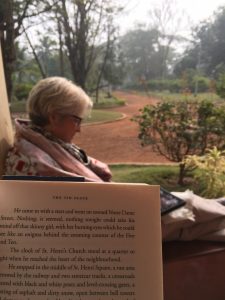Before leaving Toronto for 4 months, I worked pretty solidly over Christmas and New Year to finish as much paperwork as possible. It's still not all done.
My preparations also included buying a new laptop, because the excellent MacBook Air that I bought in 2011, was clearly approaching the end of its life. Sometimes it would just turn off, and reboot very reluctantly. I didn't think it would last 4 months in India, Bangladesh, Australia and Pakistan.
Three weeks before I left, I backed up my old laptop and transferred everything to the new one, but I kept working on the old laptop. I was used to feel of the keyboard, for one thing. Disaster struck the day of my flight to India. I went to do a final back up onto an external hard drive using Time Machine, and instead, the glitchy system responded to me poking around to find out why the back up wasn't happening, with a signal to wipe the hard drive, and restore the desktop from 3 weeks earlier!
There's nothing quite like the horror of watching a hard drive containing unbacked up material erase before your eyes.
Luckily, I had mostly been working on blog posts, and in Google Docs and Dropbox, so I was able to recover a fair amount of the deleted work. Nevertheless, I lost documents that represented a good 20 to 30 hours of work.
Having computers fail on me isn't new. In 1999, the motherboard of my main desktop Mac got fried, and it took a long time to recover the contents of the hard drive. This is why I'm obsessed with backing up, but things were so hectic, that I let it slip.
One of the things I do is to make written notes about my workflow, to help me reconstruct what I've done. These were hugely valuable, and kept me from crying.
University Internet Access in India Isn't Unlimited
Since I arrived at Visva Bharati University in the small town of Santiniketan, where I'm hosted by my colleague, Professor Shibani Chaudhury, who visited my lab in 2016, my main technological challenge has been getting reliable internet access.
My accommodation doesn't have internet, and the university wifi is limited for non-university computers. I have some access to a department desktop, but they are shared by other professors, so it would be rude to hog one all day. I could go and hang out at Shibani's house, where she has unlimited wifi, but it's a 30 minute walk from where I stay!
It felt strange to watch the students around me on their smartphones and tablets, but I learned that the students here must arrange for their own internet access, as what's provided by the university is very limited.
After a week, like many students, I got a Jiofi 4G dongle or hotspot router, which has a 2 Gig daily data limit. My younger daughter is with me for a month, en route to her semester abroad in Australia, so we basically have 1 Gig each per day. I've discovered that this is not very much to work with, compared with what I'm used to.
The first day that we were back in Santiniketan after a trip to the Sunderbans Mangrove Forest, where there was NO phone or internet reception, I didn't close the Netflix app on my iPad after midnight. Netflix kept streaming while we slept. Boom! No internet for 24 hours. My daughter said "mum, you made a very basic teenager move there."
Technology Has Its Limits
Getting out of your comfort zone to experience university life in other countries is one of the amazing things that sabbaticals allow professors to do. In my experience, it usually takes 2 weeks to get up and running in a new university.
In India, I've re-connected with my life on the internet in Toronto's pre-unlimited wifi download days. The internet has been around for a long time. Does anyone remember ethernet cables, and before that, dial-up modems? However, universities in many parts of the world still do not enjoy the kind of reliable and unlimited internet infrastructure to which York University students and faculty are accustomed, and it's good to be reminded of this.




